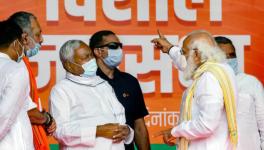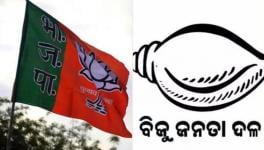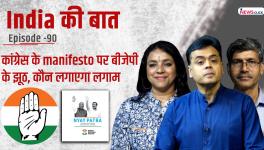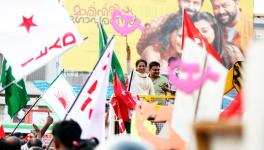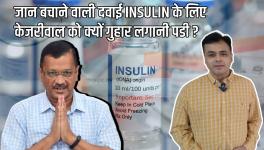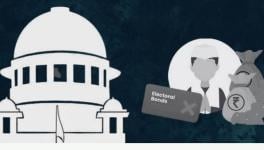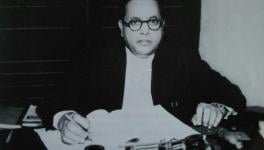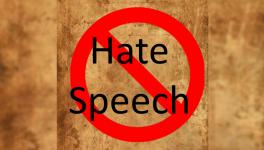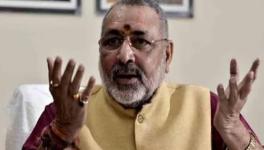Prosecute Hate Speech: Teesta Setalvad
Teesta Setalvad, eminent activist, speaks on Freedom of Dissent at the Idea of India Conclave. She emphasises the importance of having a cohesive intervention to counter the attacks on freedom of expression. Setalvad says that we must all agitate to prosecute hate speech and not allow it to be part of public amnesia, that is being forced upon us.
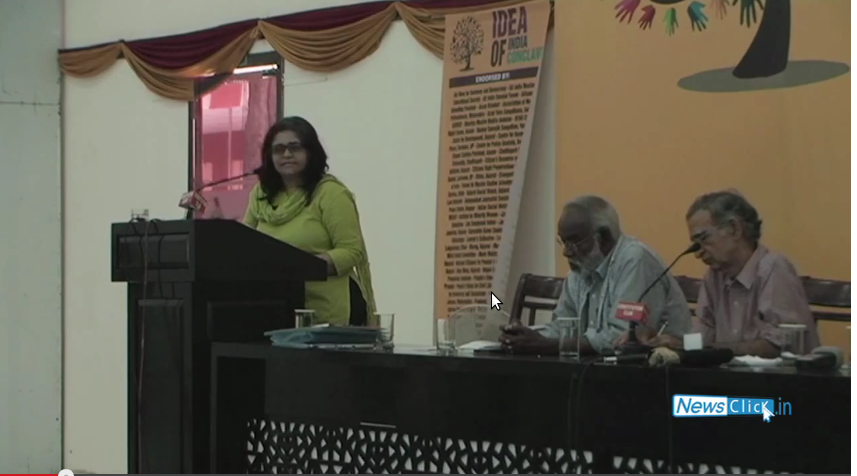
Transcript:
I would try to posit the entire issue of the freedom to dissent with the complete impunity and immunity with which the society and State has begun to regard hate speech, because I think these two things are intrinsically linked. We are looking at the culture of amnesia that this current regime embodies. The culture of forced amnesia that we are all being forced into by the current regime. Then I think we need to just look very closely at the very intense six weeks of campaigneering and almost one and a half years of the build up to that campaign when it came to extremely vicious, hard-hitting hate speech that managed to communalize the atmosphere and polarize the electorate and which we are being now told that it happens at the election time and now we should be forgetting. I think we fall into the trap of also allowing this to happen. I just like to flag a few of the most crass instances, first by the current prime minister himself when he spoke at Serampore on the border of West Bengal and Assam, when he said – just wait till May 16 and all Bangladeshis will be chucked out of India.
I am not even repeating what the Jharkhand person said in Mumbai when Modi was on the dais, when they spoke about what would happen to the dissenters; to which country they would be sent off to. I think it’s extremely important if we are talking – to agitate, to preserve the freedom to dissent, that we agitate to prosecute the hate speech that went into the election campaign and not allow it to be part of public amnesia that we are told to do.
The 2014 BJP manifesto is an extension of Golwalkar's We, Our Nationhood Defined that makes rightly, people like John Dayal extremely worried about the basic issue of citizenship. The manifesto openly said that Hindus are welcome here. I quote “India should remain a natural home for persecuted Hindus and they shall be welcome to seek refuge here.” If that is the case and that is the extension to which you can connect to the speech made in West Bengal and Assam and let’s not forget that that speech was not made in isolation, it resulted in deaths and attack on Muslims and that entire episode, because it’s happening in Congress ruled Assam is pushed below the carpet. The kind of hate speech indulged by sections of Bodo outfit, some in alliance with the Tarun Gogoi government and some not – also need an examination here. And the attacks on certain facebook users, post elections, all attacks by the police of the state where the BJP is not in power – Kerala, Karnataka, Tamil Nadu and Goa. Goa was the only one where the BJP is in power and there because of strong agitation by citizens, Denu was prevented from being arrested but in all other cases where the SFI activists in Kerala or Vakhad in Bangalore, who is a management graduate who apparently did this visual depiction of the antim sanskar of the Modi government was forced to be arrested. There is an absence of a cohesive intervention by any groups; political parties as they exist, the opposition political parties have been quite silent on these attacks on freedom of expression and I find that quite telling that the real task for a group like this and for the many others that we represent is how we reclaim not just the idea of India but reclaim and make very asserted promotion of secularism. Secularism as complete neutrality by the state and respect for pluralism as has been reiterated since the morning but we need to emphasize neutrality by the state in terms of governance, in terms of judicial decisions, in terms of police action, in terms of education in texts books and if we fail to make this link between neutrality of the state by respecting and celebrating our diversity and pluralism, I think we will not be reclaiming secularism as is the need of the hour.
Why are the opposition political parties still in a state of shell-shock silence and are not able to articulate issues of freedom and dissent is something we need to push a response out of the political class. One very very heartening image for me on the 17th of May when that pretty ghastly Ganga Arti was being performed in Banaras, was Nitish and Lalu capturing the headlines and they continue to capture them because of an attempt at reworking alliances and I think this is what we need to build and push as political activists that this cannot be a time for independent disparateness, this is a time to some how come together in whatever broad platform politically to take on the monster that we have installed in power. Another phenomenon as a media person, I would like to observe about the televised election campaign is that towards the last 4-5 weeks electronic media was not allowed to cover independently events and BJP feeds were given. BJP and RSS feeds were the only source of media information. The rallies in Amethi particularly by the Prime Minister incumbent at the time, the Ganga Arti that took place on 17th May was not independently covered by channels. It was only BJP media feed that was given to the media and they were carrying the official version of the party now in power. What does this mean for the independence of media? A young writer from Benaras called me with great agitation to say, something that I had not noticed that the camera kept focusing on that part of the Vishwanath Mandir which was supposed to be under dispute, not open to television cameras and yet that is the image that was boomed out when the Arti was performed at Vishwanath Mandir. There is a sinister game-plan at play. It’s not simply about reconstructing the state but also possibly extremely controversial and conflicting acts will take place over places of worship. There has been an attempt by several Andhra Pradesh mutts to buy over land around the Kashi Vishwanath Mandir, something that has been happening over the last 12 to 15 years. Some of us are collecting documents on this and there is no question that the administration over there, regardless of which party it represents, has plans for a grand temple like Tirupati to be rebuilt where all the “dirt around” the existing temple is cleaned up. So there are several levels of the challenge before us. Politically we know what we face. In terms of judiciary, I would like to flag off some questions, I know it’s not a subject matter of discussion directly but I think it fits squarely into the issue of dissent, that if you are talking about the independence of judiciary, already the writing is clearly on the wall – among the person’s who have been appointed as the top law officers of the country are those lawyers who defended the Gujarat government post 2002, at the most critical periods, in all the cases we were on the opposite side with lawyers whom we could not even pay fees, you had these persons being paid by the state exchequer. Mukul Rohatgi is today Attorney General, he would ask only for a chartered plane, he never went by commercial aircraft and his fees was 60 lakhs a day. We managed to get an RTI done for what the SIT council in the Zakia Jaffri case is now going to be paid, which says that the top Supreme Court counsel is going to be paid 9 lakhs a day in the Zakia Jaffri case. We are able to pay Sanjay Parikh, Kamini Jaiswal and Mihir Desai, Aparna Bhatt simply an air fare and a residency at the Sports Club. We don’t pay them any fees for the matter, we do all the preparatory work and they argue the cases but the Gujarat tax payer will now be paying 9 lakhs a day in the Zakia Jaffri case to defend SIT and defend Modi and 59 others. The fact that this government has got no time nor sees any need for the niceties of judicial independence is very clear from the recent controversy around the appointments to the Supreme Court and it’s very clear what they are going to do bottom upwards and as John said they are looking at a long term plan, they are not looking at one individual in power, they are looking to actually consolidate their base for the next 10 to 15 years. Two areas where, may be, we are weak in terms of the group that is present in this hall are rural areas and tribal areas. A book I happened to edit where Prof Archana Prasad has done a wonderful paper on allocations to tribal ministries, finds that even under the previous UPA regimes particularly last 7.5 years maximum allotments and from the central tribal ministries have gone to the VHP and RSS sponsored projects in Gujarat, in Chattisgarh and in Madhya Pradesh. So it’s happening long before they took political power. It will happen only more now as we have now seen - the appointment of ICHR chief yesterday. Mr V. Sudarshan Rao is apparently a great doyen of ancient Hindu culture and which is why he has been appointed. I think we need to look at monitoring the media very carefully, Press Council of India and Editor’s Guild because there is a complete abdication of media responsibility when it comes to these attacks on freedom. Like Anand mentioned, others mentioned and I just flagged just now – if there is one thing that broke the euphoria, even the euphoria that people like Rajdeep Sardesai and Nikhil Wagle were creating after Bal Thakeray’s death, you remember he was made into a whole martyr and a hero and the funeral... the only thing that punctured it was the arrest of Shaheen and her friend Aparna and that was blown completely on television channels day after day and night after night. You see no coverage of that sort on the facebook arrests, you have see no such coverage on any of the attacks that have taken place post May 16th. So there is a self censorship in place, there is a fear in place, there is imposed public amnesia which is in place. We are not supposed therefore to talk, not just about 2002, we are not supposed to talk from 1994 to 1999, the period of the NDA government which I would much rather do because I think we are talking of systemic issues and if we are talking about systemic issues, we are not talking about one individual then we must need to look at what the previous NDA government, far weaker than this one did in the area of culture and education, therefore we are looking at long term damage. Tribal ministry and Panchayati Raj Ministry is going to be crucial to the area for attack because I think they are looking to consolidate their 31%, close to 40%. Once they reach a 40% they are virtually undislodgible for the next considerable 20 to 30 years. So I think it’s a huge challenge not just for political parties but for all of us activists who have no luxury anymore of just working as individual groups doing excellent work but like Mallika said we better get our act together and reach out there and say how many hours of every day are we going to spend collectively and differently from what we have been doing in the past so that maybe we achieve a different result.
Get the latest reports & analysis with people's perspective on Protests, movements & deep analytical videos, discussions of the current affairs in your Telegram app. Subscribe to NewsClick's Telegram channel & get Real-Time updates on stories, as they get published on our website.









